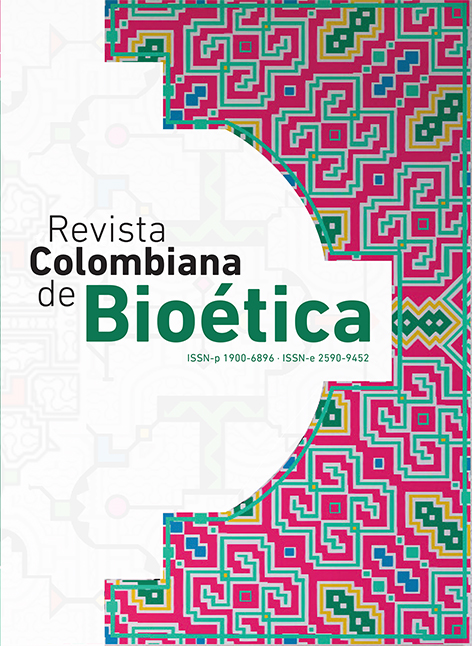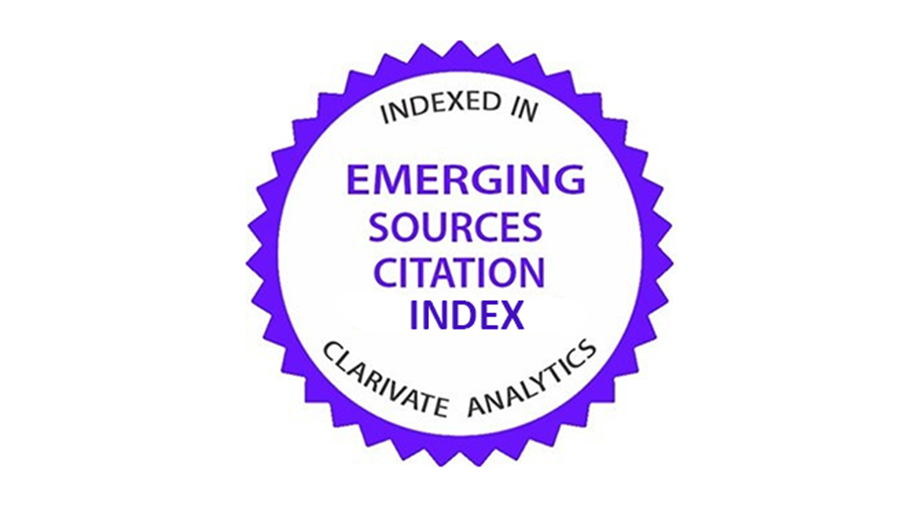Hermeneutics of burnout: A bioethical thematization in the light of the human condition
DOI:
https://doi.org/10.18270/rcb.v18i1.4335Keywords:
Burnout, Dehumanization, Bioethics, Health occupations, Occupational health, Job application, Working conditionsAbstract
Purpose/Background: Burnout syndrome as a disease, transcends the occupational, it also encompasses social, historical and individual factors. The purpose of this article is to thematize burnout as a bioethical issue that can be analyzed through the human condition described by Hannah Arendt; part of this thematization involves the unveiling of tensions that converge both conceptually and in the practical field of the evolution and diagnosis of the disease.
Methodology/Approach: The methodological proposal is based on two moments, firstly, tools from hermeneutic phenomenology are used to analyze the translation and definition of burnout outlining its theoretical and practical repercussions. Secondly, a reading is made through Hannah Arendt's concepts of work and action and some of Ricardo Maliandi's theoretical contributions of ethics as a thematization of ethos, a bioethical thematization of burnout is then proposed in the light of the human condition and the levels of ethical reflection.
Results/Findings: the results show the conflicting nature of the translation and the current definition of burnout, as well as the contradictory nature of managing stress in a labor market that requires people with the competences to work under pressure, without failing in the attempt to become ill as a result.
Discussion/Conclusions/Contributions: A bioethical thematization of burnout is more than necessary, to expose problematically anesthetic translations and definitions; but also to unveil phenomena of normalization of discourses and practices of work under pressure, which can lead to the consequence of reducing, factually and theoretically, the active life to mere survival work, and this effort to survive can threaten survival itself.
Downloads
References
Adler, Nikki, Kimberley A. Adler y Jane M. Grant-Kels. 2017. “Doctors’ Mental Health, Burnout, and Suicidality: Professional and Ethical Issues in the Workplace.” Journal of the American Academy of Dermatology 77, no. 6: 1191-93. https://doi.org/10.1016/j.jaad.2017.07.011
Agamben, Giorgio. 1998. Homo sacer. Valencia: Pre-Textos.
Altun, İnsaf. 2002. “Burnout and Nurses’ Personal and Professional Values.” Nursing Ethics 9, no. 3: 269-78. https://doi.org/10.1191/0969733002ne509oa
Antón Hurtado, Fina. 2020. “Propuesta antropológica de un modelo analítico para abordar la syndemia.” Cultura de los cuidados 58: 2. https://doi.org/10.14198/cuid.2020.58.01
Arendt, Hanna. 2009. La Condición Humana. Traducido por Ramon Gil. España: Paidós.
Azoulay, Elie, Jan De Waele, Ricard Ferrer, Thomas Staudinger, Marta Borkowska, Pedro Povoa, Katerina Iliopoulou, et al. 2020. “Symptoms of Burnout in Intensive Care Unit Specialists Facing the COVID-19 Outbreak.” Annals of Intensive Care 10, no. 1: 110. https://doi.org/10.1186/s13613-020-00722-3
Barrio, J, M García, I Ruiz y A Arce. 2006. “El estrés como respuesta.” International Journal of Developmental and Educational Psychology 1, no, 1: 37-48.
Beauchamp, Tom y James Childress. 2002. Principios de ética biomédica. Barcelona: Masson.
Békési, Dóra, Illés Teker, Péter Torzsa, László Kalabay, Sándor Rózsa y Ajándék Eőry. 2021. “To Prevent Being Stressed-out: Allostatic Overload and Resilience of General Practitioners in the Era of COVID-19. A Cross-Sectional Observational Study.” European Journal of General Practice 27, no. 1: 277-85. https://doi.org/10.1080/13814788.2021.1982889
Boateng, Adjoa y Rebecca Aslakson. 2019. “Elisabeth Kübler-Ross as Astrophysicist: Emotional Intelligence and Resilience Unlock the Black Hole of Physician Burnout, Moral Distress, and Compassion Fatigue.” The American Journal of Bioethics 19, no. 12: 54-57. https://doi.org/10.1080/15265161.2019.1674423
Calle Zapata, Mauricio. 2016. “Martin Heidegger y el intento por pensar la esencia de la técnica como una reorientación en el ethos.” Perseitas 4, no. 1: 41-61. https://doi.org/10.21501/23461780.1803
Çobanoğlu, Nesrin y Lale Algıer. 2004. “A Qualitative Analysis of Ethical Problems Experienced by Physicians and Nurses in Intensive Care Units in Turkey.” Nursing Ethics 11, no. 5: 444-58. https://doi.org/10.1191/0969733004ne723oa
Corley, Mary, Ptlene Minick, RK Elswick y Mary Jacobs. 2005. “Nurse Moral Distress and Ethical Work Environment.” Nursing Ethics 12, no. 4: 381-90. https://doi.org/10.1191/0969733005ne809oa
Cruz, Marco Antonio. 2022. Bioética y gestión de los riesgos en el trabajo. Bioética plural IV. Medellín: Editorial CES.
DeBoer, Rebecca, Espérance Mutoniwase, Cam Nguyen, Anita Ho, Grace Umutesi, Eugene Nkusi, Fidele Sebahungu, Katherine Van Loon, Lawrence N. Shulman y Cyprien Shyirambere. 2021. “Moral Distress and Resilience Associated with Cancer Care Priority Setting in a Resource-Limited Context.” The Oncologist 26, no. 7: e1189-96. https://doi.org/10.1002/onco.13818
Ferrer, Urbano. 1992. Desarrollos de ética fenomenológica, 226. https://www.um.es/urbanoferrer/documentos/Desarrollos_E.pdf
Foucault, Michel, François Ewald, Alessandro Fontana y Michel Senellart. 2016. Nacimiento de la biopolítica: curso del Collège de France, (1978-1979). Madrid: Akal.
Freudenberger, Herbert. 1974. “Staff Burn-Out.” Journal of Social Issues 30, no. 1: 159-65. https://doi.org/10.1111/j.1540-4560.1974.tb00706.x
Gadamer, Hans-Georg. 1999. ¿Quién soy yo y quién eres tú? Barcelona: Editorial Herder.
Galvez, Daniel, Alma Martinez y Fabiola Martinez. 2015. Estrés. Universidad Autonoma Metropolitana de Iztalapa. http://www2.izt.uam.mx/newpage/contactos/revista/97/pdfs/estres.pdf
Garcia, John. 2022. “Burnout as a Social Pathology in Nursing Professionals: An Analysis Based on the Theory of Recognition.” Revista Brasileira de Medicina do Trabalho 20, no. 3: 8. https://doi.org/10.47626/1679-4435-2022-771
Garcia Uribe, John Camilo. 2021. “La deconstrucción de la humanizacion: hacia la dignificación del cuidado de la salud.” Cultura de los Cuidados 25, no. 60: 19-32. https://doi.org/10.14198/cuid.2021.60.03
Greene, Graham. 2018. A Burnt-Out Case. Nueva York, Estados Unidos: Open Road Media.
Hottois, Gilbert. 2007. ¿Qué es la bioética? Traducido por Jaime Escobar Triana. Bogotá: Universidad El Bosque.
Kant, Inmanuel. 2013. ¿Qué es la ilustración? España: Alianza Editorial SA.
Kierkegaard, Søren. 2013. El concepto de la angustia. Traducido por Demetrio Gutiérrez Rivero. Madrid: Alianza Editorial.
Maliandi, Ricardo. 1991. Ética: conceptos y problemas. Buenos Aires: Editorial Biblos.
Maslach, Christina y Susan E. Jackson. 1981. “The Measurement of Experienced Burnout.” Journal of Organizational Behavior 2, no. 2: 99-113. https://doi.org/10.1002/job.4030020205
Maslach, Christina y Ayala Pines. 1977. “The Burn-out Syndrome in the Day Care Setting.” Child Care Quarterly 6, no. 2: 100-113. https://doi.org/10.1007/BF01554696
Melich, Joan Carles. 2014. Lógica de la Crueldad. Barcelona: Editorial Herder.
Millán de Lange, A y M D’Aubeterre López. 2012. “Propiedades psicométricas del Maslach Burnout Inventory-GS en una muestra multiocupacional venezolana.” Revista de Psicología (Lima) 30, no. 1. https://doi.org/10.18800/psico.201201.005
Ministerio de Sanidad, Consumo y Bienestar Social de España. 2019. Clasificación Internacional de Enfermedades CIE 10. España: Ministerio de Sanidad, Consumo y Bienestar Social de España. https://eciemaps.mscbs.gob.es/ecieMaps/browser/index_10_mc.html
Moliner, Carolina, Vicente Martínez-Tur, José M. Peiró, José Ramos y Russell Cropanzano. 2005. “Relationships Between Organizational Justice and Burnout at the Work-Unit Level.” International Journal of Stress Management 12, no. 2: 99-116. https://doi.org/10.1037/1072-5245.12.2.99
Olivares Faúndez, Víctor. 2017. “Laudatio: Dra. Christina Maslach, Comprendiendo El Burnout.” Ciencia & Trabajo 19, no. 58: 59-63. https://doi.org/10.4067/S0718-24492017000100059
Organización Mundial de la Salud. 2019. CIE-11 para estadísticas de mortalidad y morbilidad. OMS. https://icd.who.int/browse11/l-m/es#/http://id.who.int/icd/entity/129180281
Oshiro, Minei. 2021. Un análisis del síndrome del burnout desde la filosofía social. Perú: Pontificia Universidad Católica de Perú.
Ranasinghe, Padmini y Ashley Zhou. 2023. “Women Physicians and the COVID-19 Pandemic: Gender-Based Impacts and Potential Interventions.” Annals of Medicine 55, no. 1: 319-24. https://doi.org/10.1080/07853890.2022.2164046
Sisk, Bryan, Ginny Schulz, Erica Kaye, Justin N. Baker, Jennifer W. Mack y James M. DuBois. 2022. “Conflicting Goals and Obligations: Tensions Affecting Communication in Pediatric Oncology.” Patient Education and Counseling 105, no. 1: 56-61. https://doi.org/10.1016/j.pec.2021.05.003
Sládek, Karel. 2022. “Virtue Ethics in Medical Practice during the COVID-19 Pandemic.” AUC THEOLOGICA 12, no. 1: 161-73. https://doi.org/10.14712/23363398.2022.23
Soelton, Mochamad, Devy Hardianti, Suryo Kuncoro y Jumadi Jumadi. 2020. “Factors Affecting Burnout in Manufacturing Industries.” Proceedings of the 4th International Conference on Management, Economics and Business (ICMEB 2019). Jakarta, Indonesia: Atlantis Press. https://doi.org/10.2991/aebmr.k.200205.010
Teixeira, Carla, Orquídea Ribeiro, António M Fonseca y Ana Sofia Carvalho. 2014. “Ethical Decision Making in Intensive Care Units: A Burnout Risk Factor? Results from a Multicentre Study Conducted with Physicians and Nurses.” Journal of Medical Ethics 40, no. 2: 97-103. https://doi.org/10.1136/medethics-2012-100619
Valero Moreno, Adriana y Margarita Chovil de Oro. 2019. “Prevalencia de burnout en trabajadores de una empresa de transporte en Bogotá D. C.” Tesis de especialización, Universidad del Rosario. https://doi.org/10.48713/10336_20591
Vedoato, Taísa, Danielli Rafaeli Candido Pedro, Izabela Melo Garcia, Maria José Quina Galdino, Patricia Aroni y Maria do Carmo Fernandez Lourenço Haddad. 2021. “Workaholism and quality of life: an integrative literature review.” Revista Brasileira de Medicina do Trabalho 19, no. 04: 503-10. https://doi.org/10.47626/1679-4435-2021-640
Yuguero, Oriol, Carles Forné, Montserrat Esquerda, Josep Pifarré, María José Abadías y Joan Viñas. 2017. “Empathy and Burnout of Emergency Professionals of a Health Region: A Cross-Sectional Study.” Medicine 96, no. 37: e8030. https://doi.org/10.1097/MD.0000000000008030
Downloads
Published
How to Cite
Issue
Section
License

This work is licensed under a Creative Commons Attribution-NonCommercial-NoDerivatives 4.0 International License.

Esta obra está bajo licencia internacional Creative Commons Reconocimiento-NoComercial-SinObrasDerivadas 4.0.















